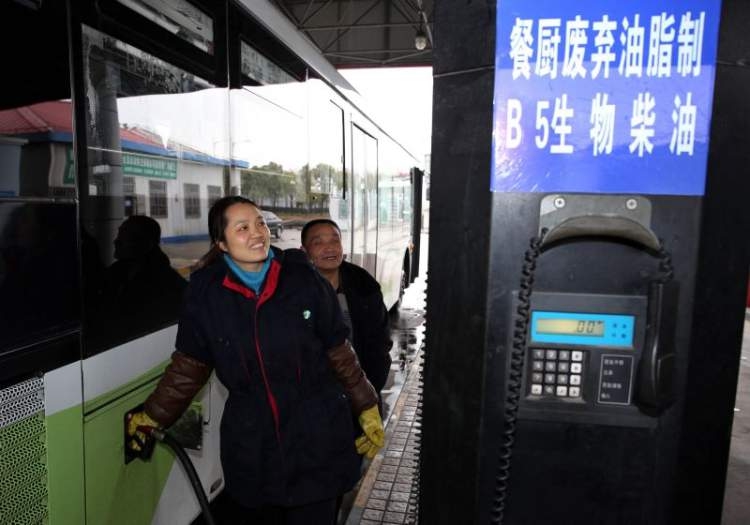Shanghai steps up use of biodiesel converted from recycled gutter oil
By converting leftover cooking oil into fuel for vehicles, east China’s Shanghai has made big strides in developing the circular economy.
The recycled waste fuel, called B5 biodiesel, is a biofuel blend consisting of 5 percent biodiesel, which is made from discarded oil from restaurants and sewer pipes, and 95 percent petroleum diesel fuel.

A worker fills up a bus with B5 biodiesel. (Photo/shxwcb.com)
B5 biodiesel produces 10 percent less heavy metal substances and fine particulate matter, and 80 percent less nitric oxide emissions compared to the exhaust from ordinary diesel.
It first entered the fuel market in Shanghai in September 2013 when buses from a bus company affiliated to the Shanghai Jiushi (Group) Co. Ltd hit the road in a trial project. To ensure smooth operation of the B5 biodiesel-fueled vehicles, the bus company checked the quality of the biodiesel on a daily basis, analyzed the gas fueling statistics, and kept track of the vehicles.
An examination of the vehicles running on B5 biodiesel conducted by Shanghai’s Tongji University indicated that the emissions standards from the vehicles had improved notably and no malfunctions had been reported.
In May 2019, buses from Shanghai Jiushi officially started running on biodiesel. By the end of 2020, the bus company had consumed 50.85 million liters of B5 biodiesel.
Over the past year or more, all bus parking lots under the bus company have adopted B5 biodiesel, consuming more than 20,000 tonnes of the fuel.
By the end of 2020, the qualification rate of B5 biodiesel was 100 percent, as indicated by inspections carried out by national and municipal quality supervision departments.
It took Shanghai 10 years to finally introduce the biodiesel into the market. As a mega-city, Shanghai produces more than 30,000 tonnes of discarded kitchen oil each year, while there are 18 recycling companies in the city that refine the gutter oil for production of B5 biodiesel. In 2013 and 2018, the city issued management guidelines to encourage recycling, transportation and processing of discarded cooking oil.
Shanghai demanded that recycling enterprises purchase discarded cooking oil at a price of no less than 3,600 yuan per tonne. In addition, it also provides a subsidy up to 0.24 yuan per liter of B5 biodiesel for oil companies.
Now, the fuel is being sold at 5.72 yuan per liter compared with 6.02 yuan for standard diesel. Shanghai’s environmental sanitation department, for instance, could save 100,000 yuan in costs in a year from 30 sanitary vehicles running on biodiesel rather than on standard diesel.
The innovative move by Shanghai to develop the circular economy marks an important effort to promote ecological civilization construction and sustainable development.
Promoting the circular economic development philosophy and efficiency in the use of resources were included in both the Outline of the 14th Five-Year Plan (2021-2025) for National Economic and Social Development and the Long-Range Objectives Through the Year 2035.
Photos
Related Stories
- China makes first cross-ocean biofuel flight
- Source control crucial to eliminating 'gutter oil'
- China debuts 1st commercial flight using 'gutter oil' biofuel
- China finishes first passenger flight with biofuel
- Boeing, China cooperate to turn "gutter oil" into biofuel
- Sinopec aviation biofuel awarded with airworthiness certificate (4)
- Sinopec aviation biofuel awarded with airworthiness certificate (3)
- Sinopec aviation biofuel awarded with airworthiness certificate (2)
- Sinopec aviation biofuel awarded with airworthiness certificate
- China puts aviation biofuel into commercial use
- Ten jailed for producing, selling "gutter oil"
- Major advance to halt flow of 'gutter oil'
- Gutter oil to be used as auto fuel
- Gutter oil profiteers sentenced
- Six jailed for producing, selling "gutter oil"
- Shanghai restauranteurs jailed over gutter oil
- Regulation to stop production of 'gutter oil'
- Shanghai restaurant owners admit using gutter oil
- A gutter-oil test kit for home use
Copyright © 2021 People's Daily Online. All Rights Reserved.










